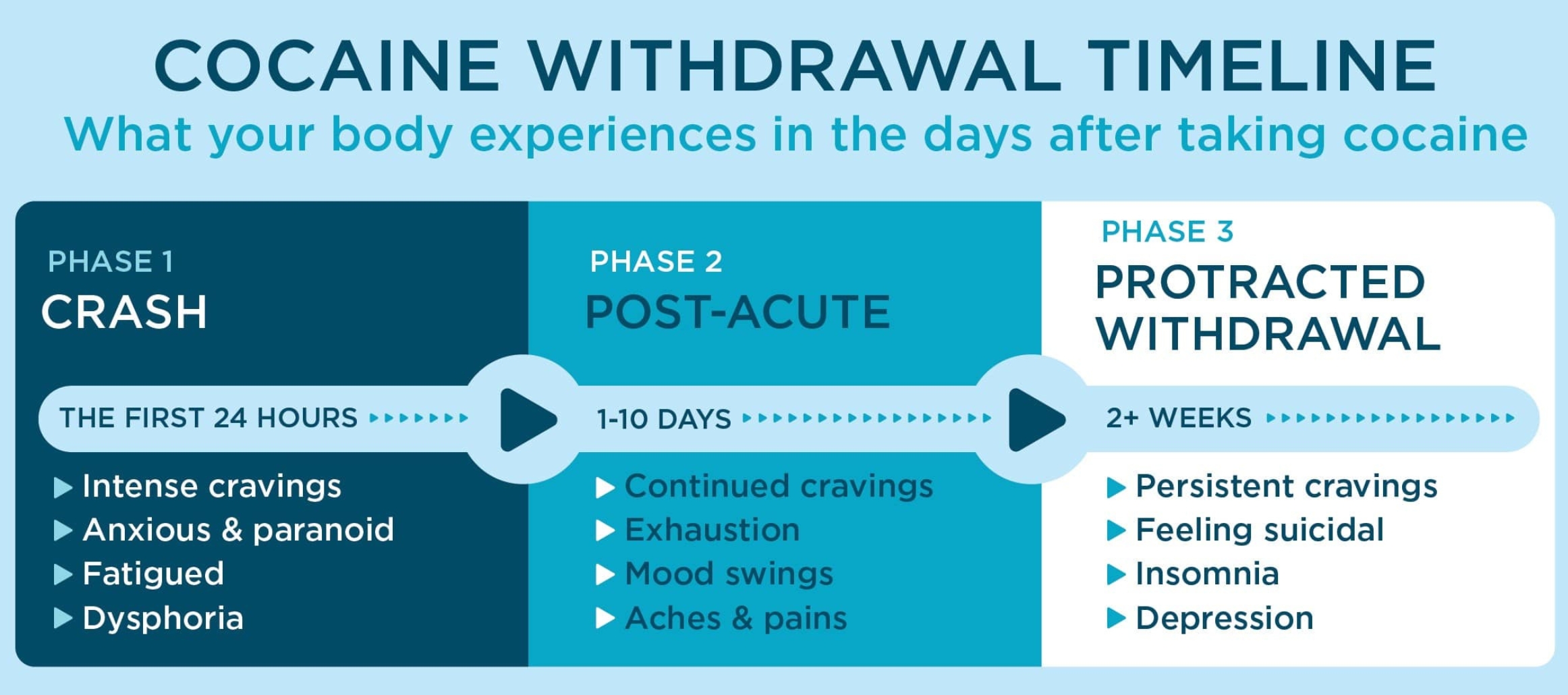Cocaine withdrawal: symptoms, timeline and treatment
Understanding cocaine withdrawal and what you should do if you’re experiencing symptoms.
Find out more about Priory's addiction support and start your recovery today.
Cocaine withdrawal can feel overwhelming, but it’s an important step towards breaking free from dependence. Understanding what to expect, and knowing when and how to get support, can make the process safer and more manageable.
At Priory, we offer expert, confidential support for cocaine withdrawal and addiction, helping you take back control of your life.
Cocaine withdrawal happens when you stop using cocaine after taking it regularly. Cocaine has a powerful effect on the brain’s reward system. It floods your brain with dopamine, a natural chemical linked to feelings of pleasure, motivation and reward. Over time, your brain starts to rely on cocaine for these surges of dopamine, rather than producing it in a balanced way on its own.
When you suddenly stop using cocaine, your brain and body need time to adjust. This can lead to withdrawal symptoms, which may be both physical and psychological. While these symptoms can feel distressing, with the right care and support, withdrawal can be managed safely.
Withdrawal symptoms can vary depending on how much cocaine you’ve been using, how often, and the way you’ve been taking it (snorting, smoking or injecting).
Cocaine withdrawal typically happens in stages:

Cocaine withdrawal is rarely life-threatening, but in some cases severe symptoms can develop. These may include:
If you experience any of these symptoms, it’s important to get urgent medical help. In an emergency, call 999. For more advice and support, visit our crisis support page.
Trying to go through withdrawal on your own can feel overwhelming, and it may increase the risk of relapse. Having medical support around you means you don’t have to face it alone.
A medically supervised detox offers:
This approach makes withdrawal safer, more manageable and less distressing.
At Priory, we provide evidence-based support for cocaine addiction and withdrawal at our UK hospitals and wellbeing centres. Depending on your clinical needs, you may receive detox on its own or continue with further support afterwards. Our services include:
We also offer a free, confidential addiction assessment to understand your individual needs. This helps us determine whether a standalone detox or a combination of detox and ongoing support is the most suitable approach for you.
Alongside medical supervision, there are small steps you can take to care for your body and mind through withdrawal:
These steps can make withdrawal more manageable, but professional care remains essential to ensure your safety and comfort.
While detox is only the first stage of addiction treatment, completing it brings important benefits:
Detox is the first step towards change. For some people, this may then lead on to therapy and longer-term treatment.
You don’t have to face cocaine withdrawal alone. Specialist treatment and support can make a lasting difference.
Contact Priory today to arrange your free, confidential addiction assessment and find out how we can help.
Discover some commonly asked questions about cocaine withdrawal.
Withdrawing from cocaine can be uncomfortable and dangerous.
Withdrawal shouldn’t be attempted at home alone - instead, it should be done with a medical professional as part of a medically assisted detox.
The goal of cocaine detox is to remove all traces of cocaine from your body. This takes place in a supportive and safe environment, and you may receive controlled medication to help you manage your withdrawal symptoms. Medical and nursing staff will be available 24/7 to ensure your safety and comfort during this period.
For most people, the detox process lasts between 7 to 10 days, although this will depend on various factors such as the frequency of consumption and the intensity of your withdrawal symptoms.
Cocaine is a highly addictive stimulant drug that’s used recreationally by some people. Its potency means that a regular user may experience withdrawal symptoms when they stop taking the drug.
Cocaine can make you feel euphoric, confident and uninhibited due to the way it interacts with the brain. This ‘high’ comes from elevated dopamine levels, which ‘crash’ once you stop taking the drug.
While cocaine withdrawal is not usually life-threatening, the psychological symptoms, such as depression and suicidal thoughts, can pose serious risks.
Physical symptoms like increased heart rate and blood pressure may be particularly dangerous for those with pre-existing conditions.
Depending on your needs, cocaine withdrawal usually happens as part of an inpatient treatment programme. This typically includes a detox, addiction therapy and family support, to help you achieve a full and long-lasting recovery. Medication may also be prescribed to help reduce any symptoms of addiction and allow you to fully focus on recovery.
Explore our range of addiction treatment options – including programme formats, settings and pricing – on our dedicated addiction services page.